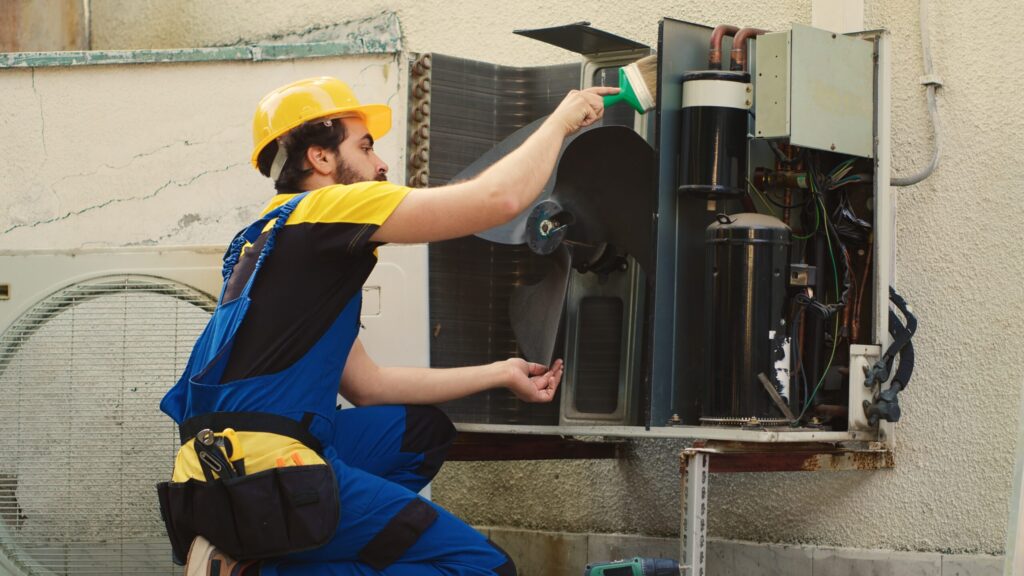
Keeping your AC Condenser clean is the secret to smooth cooling during the intense UAE summers. This vital component transfers heat from your home to the outside, helping your air conditioner run efficiently. When dirt, dust, and debris clog the AC Condenser, cooling performance drops, energy bills rise, and the risk of damage increases.
Regular LG AC Condenser cleaning improves airflow, lowers strain on the compressor, and keeps your home comfortable even on the hottest days. Whether you prefer DIY AC condensers cleaning or professional service, learning the right method ensures your cooling system lasts longer and works at peak efficiency.
Why Cleaning Your AC Condenser Is Important
The desert climate in UAE means more sand and dust find their way into your outdoor AC unit. Over time, this buildup reduces airflow and efficiency. Regular AC condensers cleaning not only lowers energy bills but also keeps your air fresh and safe to breathe.
Another reason why AC condensers cleaning is important is that it prevents costly breakdowns. When your condenser coils are clogged, your system works harder, putting strain on the compressor. This can lead to expensive repairs or even total unit replacement if ignored.
Signs Your AC Condenser Needs Cleaning
When airflow becomes weak, cooling takes longer, or your electricity bill rises without extra use, it is a warning sign. A visual check can also help — dirt, leaves, or sand around the clean AC unit outside are early indicators.
Another sign is warm air coming from vents or strange noises from the outdoor unit. These symptoms mean it’s time to remove dirt from AC condenser and restore proper performance before the problem grows worse.
Tools and Materials You’ll Need for the Job
Having the right tools required to clean AC condenser is crucial for a safe and effective job. A soft brush, AC coil cleaner, gloves, and a garden hose are enough for basic maintenance. A fin comb and screwdriver help open panels and straighten bent fins for better airflow.
Eco-friendly cleaning solutions are best for air conditioner condenser coil cleaning. They remove grime without damaging metal fins or harming the environment. Using the right supplies ensures you get the best way to clean AC condenser with minimal risk.
Step-by-Step Guide to Clean an AC Condensers
Knowing how to clean AC condensers step by step makes the process simple. First, disconnect the power supply completely. This prevents electric shock while working on your outdoor AC unit maintenance.
Next, open the cover, clear debris by hand, and use a soft brush to loosen dirt. Spray the AC coil cleaner evenly, wait for it to work, and rinse gently with water. Reassemble the unit and check cooling performance to confirm the job is done right.
How to Safely Turn Off Your AC Before Cleaning
Switching off the breaker or using the disconnect box is essential for safe AC maintenance tips. Never rely only on the remote control as power still flows to the unit.
Always wear protective gloves and ensure the ground is dry. This step protects you from accidents and makes DIY AC condensers cleaning secure for homeowners.
Deep Cleaning the Condenser Coils for Better Cooling
Deep cleaning involves focusing on the coils. This is where most dirt collects and affects cooling efficiency. Proper HVAC system cleaning restores full airflow, helping you improve AC efficiency even in peak summer.
For heavy dirt buildup, professionals use specialized cleaners and fin combs. Their techniques for central AC condensers care are more thorough than DIY, ensuring every part is spotless.
Common Mistakes to Avoid When Cleaning an AC Condenser
One of the most common mistakes is using a high-pressure washer. This bends the fins and blocks airflow. Harsh chemicals are another mistake that may corrode the coils.
Skipping power disconnection or forgetting to straighten fins can cause permanent damage. Avoid these errors to make your DIY AC condenser cleaning effective and safe.
How Often Should You Clean Your AC Condenser?
Many homeowners wonder how often to clean AC condenser. In UAE, it is best to do it at least twice a year due to dust and sandstorms.
Cleaning before summer and again in mid-season keeps your cooling strong. Regular HVAC system cleaning also reduces the cost of AC condenser cleaning since it prevents major damage.
Professional AC Condenser Cleaning Services in UAE – UAE LG Repair
While DIY is good for light maintenance, nothing beats expert help. Professional AC cleaning services near me have the tools to clean coils deeply without damage.
UAE LG Repair offers comprehensive AC condenser cleaning across the UAE. Their trained team uses advanced equipment and eco-friendly products to restore maximum cooling power safely and efficiently.
Final Tips to Keep Your AC Running Efficiently
Keep the area around the outdoor unit free from plants and debris. Check your filters monthly and replace them when dirty.
Scheduling an annual inspection from a trusted service like UAE LG Repair ensures long-term performance. These habits guarantee benefits of cleaning AC condenser coils year-round.
Table: DIY vs Professional AC Condenser Cleaning
| Aspect | DIY Cleaning | Professional Cleaning (UAE LG Repair) |
|---|---|---|
| Safety | Requires caution | Fully safe with expert handling |
| Tools | Limited to basic tools | Industrial-grade equipment used |
| Depth of Cleaning | Surface level | Deep, thorough cleaning |
| Time Required | 1-2 hours | 30-45 minutes |
| Cost | Low (just supplies) | Affordable, saves costly repairs |
FAQs
How long does it take to clean an AC condenser?
Usually 30 minutes to 2 hours depending on dirt buildup.
Can I clean the AC condenser myself safely?
Yes, with proper precautions and following safe AC maintenance tips.
How much does professional condenser cleaning cost in UAE?
The cost of AC condenser cleaning ranges from AED 200-400 depending on service and unit size.
What happens if I don’t clean my AC condenser regularly?
It reduces cooling efficiency, raises energy bills, and can damage the compressor.

